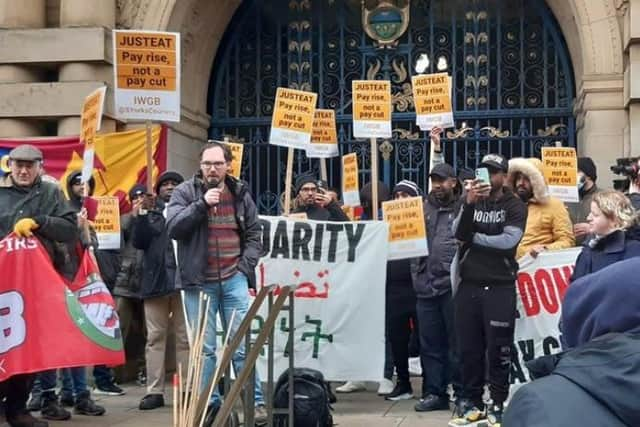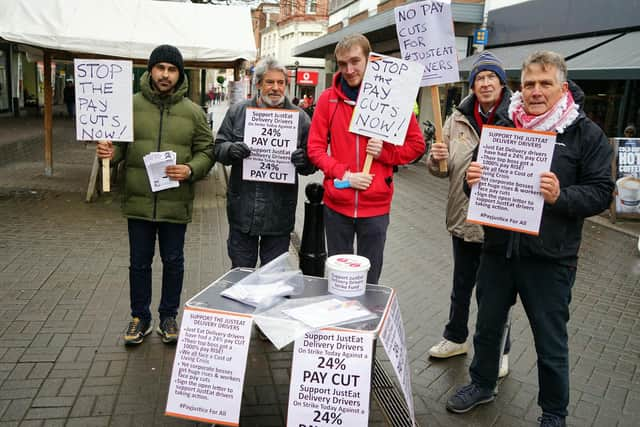Stuart and Just Eat courier drivers strike, started in Sheffield, approaches 100 days
and live on Freeview channel 276
Drivers are taking on Stuart Delivery, a delivery partner of Just Eat, over ‘poverty wages’.
The gig economy strike started in Sheffield and has since spread to towns and cities all across England has now been going on for almost 100 days.


Advertisement
Hide AdAdvertisement
Hide AdCourier drivers and the IWGB trade union say they will continue their fight until changes to their pay structure - a 24 per cent cut to the base delivery rate - are reversed.
Why are couriers on strike?
The drivers’ struggle against app-based delivery firm Stuart, and one of their main partners, Just Eat, is the longest-running gig economy strike in UK history.
After being hailed as key workers, with many having delivered food and medicine during the pandemic, self-employed couriers who work through the Stuart delivery app saw their pay structure change toward the end of last year.


Stuart has insisted the new pay structure, which saw the base rate for each delivery cut by 24 per cent, is not a pay-cut as drivers receive more per-mile pay.
Advertisement
Hide AdAdvertisement
Hide AdCouriers say this is not the case in practice, with the union reporting some members’ income dropping by as much as £100 per week after the change.
While Stuart has made a number of changes in line with the couriers’ demands on other issues, the workers are keen to stress that pay is their primary concern.
Parirs Dixon, figurehead of the strike and president of the IWGB Couriers Sheffield Branch, says that levels of pay were too low before the cut, and are now even more so due to the rising cost of living - which hits couriers particularly hard.
He said: “We have insurance costs, we have extra business insurance, that can be an extra £2,000-£3,000. Fuel is a lot extra. Not long ago £40 worth would last me a good two days, but now it’s gone after a day.”
Advertisement
Hide AdAdvertisement
Hide AdIWGB president Alex Marshall told NationalWorld that couriers have been hit “doubly hard by the rising cost of living and recent fuel spikes” as they must cover their own fuel and vehicle costs.
Which companies have been targeted during the dispute?
On 24 March dozens of activists turned up at Greggs’ head office in Gateshead, in protest against the company’s partnership with Just Eat, which subcontracts work to Stuart.
After starting their protests in early December 2021, this was just the most recent demonstration in a long campaign of industrial action involving marches, daily pickets in some towns, and shorter ‘all-out’ strikes in others.
In the first phase of the strike workers shut down deliveries from all McDonald’s branches in Sheffield for a few hours every day by refusing orders, and in the most recent phase have begun targeting Greggs.
Advertisement
Hide AdAdvertisement
Hide AdFrom there, the strike has spread across England via word of mouth and Whatsapp networks linking the courier driver community, with many people reaching out to the IWGB union for support coordinating their own protests.
Organisers say the strike has grown at a rate that no one could have predicted, with drivers in well over a dozen towns across England now involved directly through the union, and more with unofficial links.
“Every few days another town joins in,” says one organiser, who adds that there are around 10 more towns where drivers are actively planning strike action of some kind that they know of, and, “almost certainly more,” that they don’t.
The strike has spread organically over the last few months, with organisers stressing that there are likely many more towns where strikes and other protests are currently ongoing or being planned without the union’s knowledge
Advertisement
Hide AdAdvertisement
Hide AdThe strike organisers have consciously sought to minimise the impact on independent and smaller businesses where possible, focusing instead on large chains.
As well as McDonalds, KFC, Burger King and Greggs, other big-name brands such as Tesco and DPD have also faced protests, due to their links with Stuart.
The former is a delivery partner of Stuart while the latter is the delivery firm’s ultimate owner, though DPD is in turn owned by the French state-owned La Poste Group
Marshall accused all the “major clients” of Just Eat of being complicit in the exploitation of courier drivers and warned that IWGB, “will continue to take action against any company that ignores the concerns of the workers who deliver its products".
Advertisement
Hide AdAdvertisement
Hide AdA spokesperson for Greggs said: “We are aware of the dispute, but we have no direct involvement nor influence with Stuart.
“Our delivery partner Just Eat will keep us updated, and we do hope the situation is resolved for everyone very soon.”
How does the strike work?
Drivers, IWGB trade union activists and their supporters have held daily pickets and dozens of protests in recent months, with most of the day-to-day activity happening in Sheffield.
Sometimes the aim of an action is to shut down deliveries from specific restaurants for a designated period of time each day for a prolonged period, as in Sheffield, where the strike originated.
Advertisement
Hide AdAdvertisement
Hide AdAs the strike has spread organically, some other groups of couriers have opted for slightly different tactics, deploying ‘all-out’ strikes and shutting down the Just Eat app in their area entirely for periods of time, by refusing all deliveries.
The level of activity has remained constant throughout the last few months, as couriers from across the country have heard about the strike and started up actions of their own, often with support from IWGB.
In many cases, the workers use pickets - a number of people attempting to convince any delivery drivers who would consider breaking the strike to instead join their cause - to prevent orders from going out.
The goal of each picket or action is to get the target store – generally a busy, big-name fast-food chain like McDonalds or Greggs – to ‘turn off the tablet’.
Advertisement
Hide AdAdvertisement
Hide AdThat is, to shut down the app - generally installed on an Ipad or tablet - through which the restaurant receives and organises delivery orders.
Would-be customers are met with a message saying Greggs is not taking orders, as a result of strike action by couriers in Chesterfield
Restaurant staff sometimes decide to shut down deliveries by necessity, because all the drivers are on strike or because a sizable picket has made it impossible to carry out deliveries.
But it is not uncommon for restaurant staff who support the delivery drivers’ cause to come to agreements with the drivers and shut down the delivery service for agreed periods even when there are no pickets in place.
Advertisement
Hide AdAdvertisement
Hide AdIn Sheffield, the striking workers have received support from a group of local restaurants and other businesses, with more than a dozen signing a letter to Stuart backing the couriers’ demands.
Some of those demands have already been met, although the central complaint about the pay structure is yet to be resolved.
In line with previous comments on the dispute a Just Eat spokesperson said: "We are keen to maintain an open dialogue on issues that are important to couriers.
“We are working with our third party delivery partner and are having ongoing discussions with them on this matter."
Advertisement
Hide AdAdvertisement
Hide AdJust Eat declined to offer any further information on the progress of these talks, which have been ongoing since the dispute began, or to clarify what their position is within the discussions.
Stuart Delivery did not respond to request for comment on this article, but a spokesperson has previously said: “The change to our pay model was made to ensure couriers on the Stuart platform will be paid more fairly based on the distance they travel per delivery.
“This is part of our commitment to being the best delivery platform for couriers looking for flexibility and financial stability.
“The new model has been developed so that it works for all couriers, whether they do shorter deliveries more frequently or fewer, longer trips, and will continue to guarantee pay per hour that is among the highest in the sector.”
